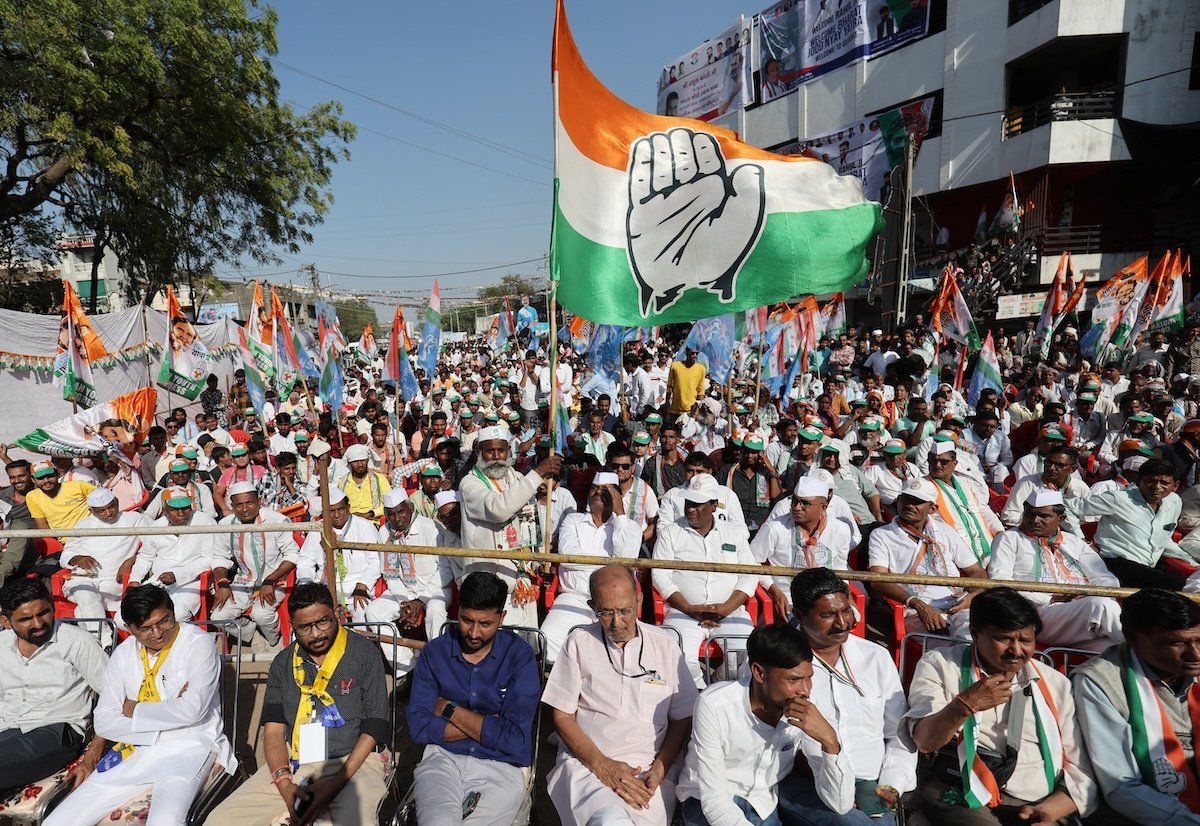A supporter of Rahul Gandhi, a senior leader of India's main opposition Congress party, waves a party flag in a public meeting during Rahul's 66-day long "Bharat Jodo Nyay Yatra," or Unite India Justice March, in Jhalod town, Gujarat state, India, in March 2024.
The names Mahatma Gandhi, Jawaharlal Nehru, and Indira Gandhi are synonymous with Indian independence and the country’s early development. But with India starting to head to the polls on April 19, we ask what happened to their once-dominant Indian National Congress Party.
A titan in Indian politics for over 50 years after independence in 1947, today’s Congress is struggling for relevancy. If it doesn’t find a way to resonate with the biggest voting bloc, those aged 18-35, in the world’s fifth-largest economy – it will stand no chance of ever facing down Prime Minister Narendra Modi’s ruling Bharatiya Janata Party.
Heyday and downfall
Founded in 1885, Congress leaders like Mahatma and Indira Gandhi, Nehru, and Manmohan Singh played pivotal roles in campaigning for independence and later shaping India’s political and economic position. While Nehru, the first prime minister, touted secularism, his successor and daughter, Gandhi, led anti-poverty campaigns during her tenure. More recently, Singh played a key role in making India the second fastest-growing economy by uplifting the country’s GDP to 9% in 2007.
But voters tend to sour on those in power during economic downturns, and a mix of high inflation and corruption scandals led to Congress’ worst electoral performance in the 2014 Lok Sabha elections. The party, headed by the inexperienced Rahul Gandhi, won just 44 of 543 seats, creating more space for the BJP.
Congress did only slightly better in the 2019 elections, winning 52 seats, leading Gandhi to quit the party presidency. His mother and one of the most influential leaders of Congress who played a crucial role in the 2004 election victory, Sonia Gandhi, once again took the reins as interim president for three years. Today, Congress is led by Mallikarjun Kharge, and it’s in power in just three of 28 states: Karnataka, Himachal Pradesh, and Telangana.
Lackluster leadership
Congress party leaders are struggling to connect with their base, and efforts to hurt the BJP with slogans like “the watchman is a thief” are not landing with voters. Initiatives like Rahul Gandhi’s ambitious Bharat Jodo Yatra and Nyay Yatra mass marches in 2022 and 2024 have failed to gain much steam.
Congress also “faces issues related to a deteriorating organizational structure and internal factionalism,” says Rahul Bhatia, Eurasia Group’s South Asia analyst.
As recently as last month, internal discord was exposed during the party’s selection of electoral candidates to represent the southern state of Telangana when complaints accused the screening committee of sending the candidate list without consulting party ministers. A similar case was also reported in Chandigarh.
“While the party has taken measures to remedy some of these [problems] in the last two years, it still hasn’t been able to articulate a clear political narrative that captures the imagination of Indian voters like Modi has,” says Bhatia.
Trying to build a worthy opposition
In a bold attempt to challenge the BJP’s dominance with a stronger opposition, Congress pushed to create theIndian National Developmental Inclusive Alliance bloc, aka INDIA, in 2023, initially comprising 41 parties. At first, it looked promising, but the departure of key players like Nitish Kumar and Mamata Banerjee in January has left INDIA in disarray, casting doubts on its efficacy ahead of the election. In the unlikely event INDIA wins, Congress has vowed to raise the 50% reservation quota for nationally recognized marginal communities (Scheduled Castes, Scheduled Tribes, and Other Backward Classes) to get them more representation in educational institutes and employment.
But INDIA is only expected to win 94 seats, with Congress getting 38, while the BJP is predicted to snag 399 constituencies. To secure a majority, a party or a coalition needs 272 seats.
Modi, 73, is widely popular with anapproval rating as high as 75%. “Under Modi, the BJP is a formidable electoral machine, and no one has been able to consolidate the Hindu vote as well as Modi has, drawing in lower middle castes, upper castes, and low-income groups,” says Bhatia.
For now, Congress “is not fighting to win the upcoming elections but rather to limit Modi’s majority,” he adds. The party is expected to retain roughly 20% of the vote and potentially win some state elections.
Should the BJP’s vote share fall, the INC could orchestrate a comeback at the national level. “The party is by no means finished,” says Bhatia.
But to get back to the power of its heyday, Congress would need to go through a complete internal overhaul, experts say. And the immediate problem, says Bhatia, is that Congress “is not ready to accept a complete restructuring, nor will it seek leadership beyond the Gandhi family.”
